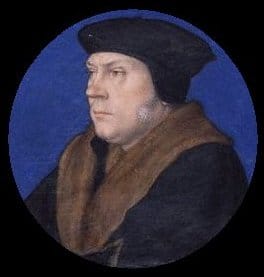 On this day in history, the 28th July 1540, Thomas Cromwell, Earl of Essex, was executed by being beheaded on Tower Hill. Cromwell had been arrested on the 10th June 1540 at a council meeting and a bill of attainder was passed against him on the 29th June 1540 for the crimes of corruption, heresy and treason, stripping him of his honours and condemning him to death.
On this day in history, the 28th July 1540, Thomas Cromwell, Earl of Essex, was executed by being beheaded on Tower Hill. Cromwell had been arrested on the 10th June 1540 at a council meeting and a bill of attainder was passed against him on the 29th June 1540 for the crimes of corruption, heresy and treason, stripping him of his honours and condemning him to death.
On the 28th July, he climbed the scaffold on Tower Hill and addressed the gathered crowd. He opened by saying “I am come hither to die and not to purge myself, as some think peradventure that I will”1 and then went on to acknowledge that he had offended God and the King and asked for their forgiveness. He then declared “I die in the Catholic faith, not doubting in any article of my faith… nor in any sacrament of the church”2, however, as his biographer, John Schofield3 points out, Cromwell was using gallows humour and irony here and did not mean that he was dying a true Catholic. Cromwell was using the word “Catholic” in the way that men like Cranmer, Melancthon and Luther used it, referring to the New Testament “Holy Catholic and Apostolic Church”, the one of the Nicene Creed, not the Church of Rome.
After this clever use of words, Cromwell continued his speech by denying the charges that had been laid against him and saying: “Many have slandered me, and reported that I have been a bearer of such as I have maintained evil opinions; which is untrue: but I confess, that like as God, by His Holy Spirit, doth instruct us in the truth, so the devil is ready to seduce us; and I have been seduced.”4 Schofield does not believe that Cromwell was confessing his guilt here, but that he was making a “sort of sweeping, general confession” of sin, as was the custom in scaffold speeches.
Thomas Cromwell then committed his soul to his Saviour, Jesus Christ, calling on his mercy and stating his faith in the resurrection and justification by faith alone, a reformed idea:-
“I see and acknowledge that there is in myself no hope of salvation, but all my confidence, hope and trust is in thy most merciful goodness. I have no merits or good works which I may allege before thee.”5
Here, Thomas Cromwell was making it clear that he held Lutheran beliefs and was indeed what many would call a heretic. He then knelt at the block and was beheaded “by a ragged and Boocherly miser, whiche very ungoodly perfourmed the office”6 – a botched execution in other words.
I know that many people think of Thomas Cromwell’s brutal end as karma, a case of “what goes around, comes around”, but I just can’t think like that. It is hard to know what his true involvement was in the downfalls of Anne Boleyn, George Boleyn, Sir Henry Norris, Sir William Brereton, Sir Francis Weston and Mark Smeaton, whether it was his idea alone or whether he was ordered to take action by the King, but whatever the case surely no-one deserves to die such an awful death.
In March 1541, under 8 months since Cromwell’s death, the French ambassador, Charles de Marillac, reported Henry VIII’s regret at what had happened to the man he once relied on so heavily:-
“Directs attention to the instability of the people and this King’s impression of his ministers, whom (besides what Marillac writes to the King) he sometimes even reproaches with Cromwell’s death, saying that, upon light pretexts, by false accusations, they made him put to death the most faithful servant he ever had.”7
What a shame that the King did not realise what a good man he had in Cromwell before he had him executed!
Notes and Sources
- The Rise and Fall of Thomas Cromwell: Henry VIII’s Most Faithful Servant, John Schofield, p268
- Ibid
- Ibid
- Ibid
- Ibid., p269
- Hall’s Chronicle, Edward Hall, p839
- LP xvi.590